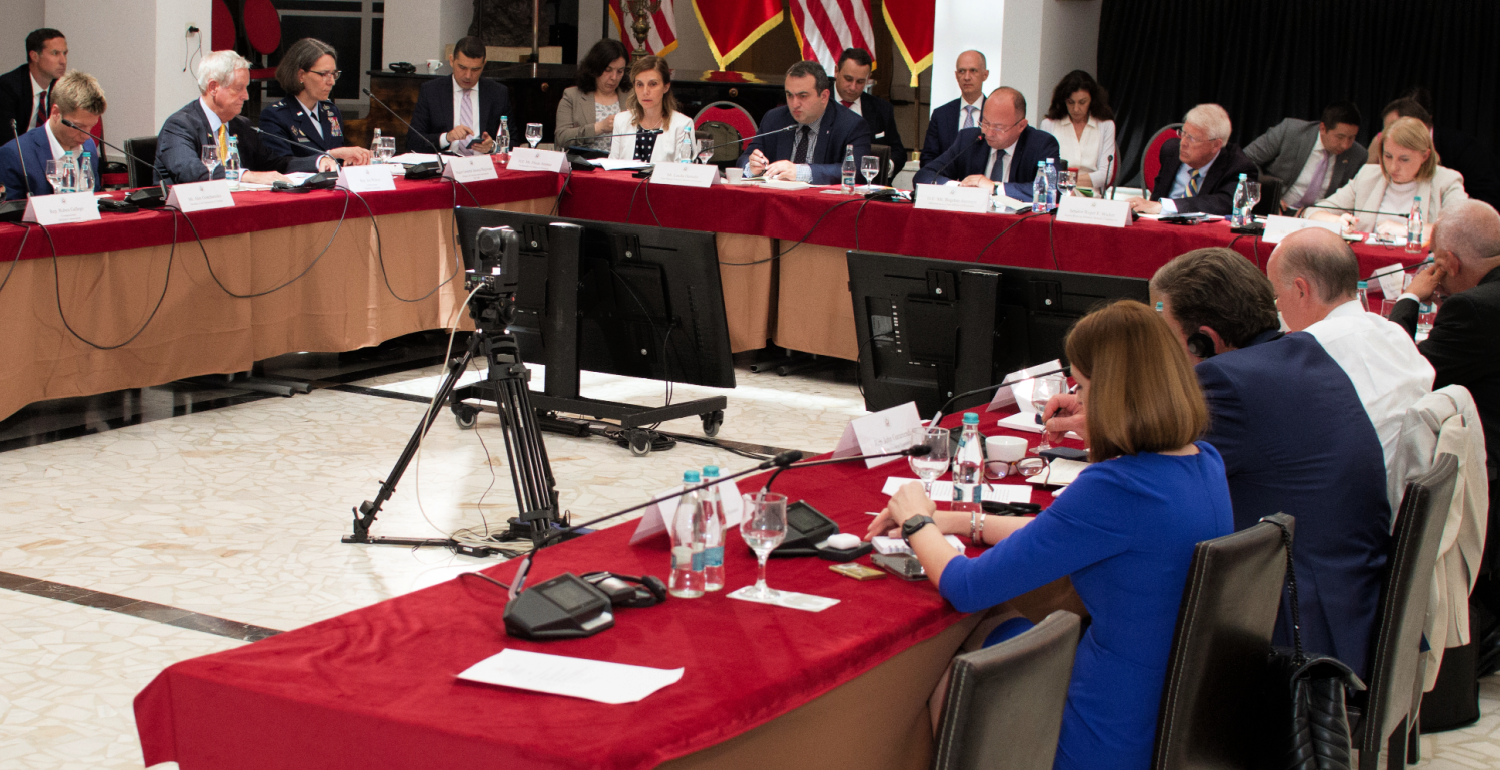A Roundtable Dialogue Hosted by the Commission on Security and Cooperation in Europe
On the heels of the 2022 NATO Summit in Madrid, on July 1 the Commission on Security and Cooperation in Europe, also known as the Helsinki Commission, convened its first-ever multilateral dialogue among key regional allies and partners on Black Sea security.
At this historic event on the shores of the Black Sea, members of the U.S. Congress, senior-level government officials from the region, and key international partners came together in a roundtable format to underscore the critical importance of the Black Sea region to European peace and security, and to establish a sustainable, collective approach to ending Russian aggression and enhancing mutual cooperation.
Co-chaired by Helsinki Commission Ranking Member Sen. Roger Wicker (MS) and Minister Bogdan Aurescu, Minister of Foreign Affairs of Romania, the summit featured a timely and collaborative exchange exploring major themes pertaining to regional security challenges: confronting Russian aggression and the relevance of the Black Sea to Euro-Atlantic security.
The co-chairs were joined by senior-level regional government officials and a bipartisan delegation of members of both the U.S. Senate and the U.S. House of Representatives, including Sen. John Cornyn, Rep. Joe Wilson, Rep. Richard Hudson, Rep. Ruben Gallego, Rep. John Garamendi, Rep. Robert Aderholt, and Rep. August Pfluger.
Other participants included:
Romania
- Minister Bogdan Aurescu, Minister of Foreign Affairs of Romania
- State Secretary Simona Cojocaru, State Secretary and Chief of the Department for Defense Policy, Planning and International Relations, Ministry of Defense of Romania
- MP Pavel Popsescu, Member of the Romanian Parliament; Chair, Defense Committee
- MP Ana Cătăuță, Member of the Romanian Parliament
Ukraine
- Deputy Minister Oleksandr Polishchuk, Deputy Minister of Defense of Ukraine
- MP Alexander Goncharenko, Member of the Ukrainian Parliament
Bulgaria
- Deputy Minister Yordan Bozhilov, Deputy Minister of Defense of Bulgaria
- Ambassador Radko Vlaykov, Ambassador of Bulgaria to Romania
- MP Kaloyan Ikonomov, Member of the Bulgarian Parliament; Chair, Bulgaria – USA Friendship Group
Georgia
- First Deputy Minister Lasha Darsalia, First Deputy Minister of Foreign Affairs of Georgia
- Ambassador Nikoloz Nikolozishvili, Ambassador of Georgia to Romania
Turkey
- Ambassador Füsun Aramaz, Ambassador of Turkey to Romania
NATO
- Deputy Secretary General Mircea Geoană, Deputy Secretary General of NATO
U.S. European Command
- Major General Jessica Meyeraan (USAF), Director of Exercises and Assessments, U.S. European Command
Relevance of the Black Sea to Euro-Atlantic Security
During the summit, participants underscored the importance of security in the Black Sea littoral in the face of Russian aggression. Deputy Secretary General of NATO, General Mircea Geoanӑ, emphasized the importance of the Black Sea to Euro-Atlantic security, stating that the region reflects “broader competition between revisionist and brutal and aggressive Russia and our democratic world.”
According to General Geoanӑ, NATO is committed to supporting Ukraine through military, financial, and humanitarian means and providing security in the Black Sea littoral that reestablishes freedom of movement, shipping, and navigation.
Bulgarian Deputy Minister of Defense, Yordan Bozhilov noted that the Russian invasion of Ukraine “has far-reaching destabilization implications at the regional level and beyond,” including the resulting energy and food crises.
Georgian First Deputy Minister of Foreign Affairs, Lasha Darsalia, emphasized the political, economic, and security importance of the Black Sea region to Georgia and highlighted increased security in the region as an opportunity to increase “international cooperation and connectivity.”
He recalled Georgia’s support for Ukraine in the face of Russian aggression, characterizing the invasion of Ukraine as another step in Russia’s malign attempt to control the Black Sea region.
U.S. Representative August Pfluger stressed the importance of the Black Sea region to energy security in the pursuit of decreasing dependence on Russian energy.
Confronting Russian Aggression
Throughout the summit, participants called for increased unity to confront Russian aggression. Ukrainian Member of Parliament, Alexander Goncharenko, requested a stronger NATO and US presence in Ukraine, after powerfully highlighting Ukrainian bravery in the face of Russian hostility.
In reference to Russia’s weaponization of Ukrainian grain supply and the expansion of NATO, Gonchareko stated, “It is very good that the free world is finally uniting, but we must show strength. The first place we must show strength is in the Black Sea, as a humanitarian mission, to save millions of people. Thousands are killed in Ukraine, but millions will die from starvation.”
Turkish Ambassador to Romania Füsun Aramaz underscored her country’s support of Ukrainian sovereignty. She acknowledged the common security goals of all participants at the summit and desires close alignment with NATO, but warned against over-militarization of the region, citing a potential to violate the Montreux Convention.
“More vessels at sea or more fighter aircraft in the air alone do not mean more deterrence or stronger defense,” she stated.
U.S. Major General Jessica Meyeraan of the United States European Command explained that the United States is supporting Ukraine by increasing understanding of Ukrainian security assistance requirements and “collaborating across over 40 nations to understand how we can quickly and effectively satisfy those security cooperation requirements.”
Minister Aurescu explained that the projects that maintain regional security structures are the result of bilateral relationships between the United States and various littoral states and are essential in the face of Russian aggression and illiberalism that has resulted in regional and global crises.
He also called to “increase the scale and visibility of the U.S. presence in the region,” beyond just a military presence through the creation of a multifaceted strategy based on strategic resilience.
Rep. Hudson noted that “NATO stands ready” in the face of increasing threats in the region. In addition, Rep. Gallego emphasized the importance of deterrence by denial, clarifying that this sort of offensive is only possible through a completely integrated defensive approach.







